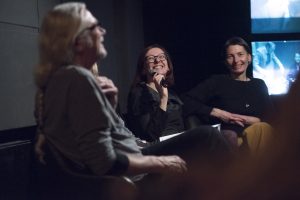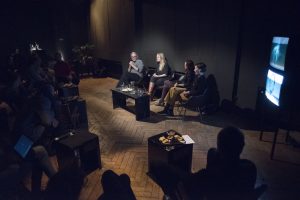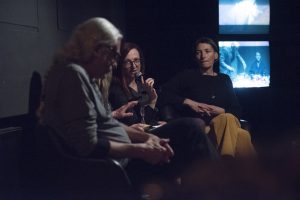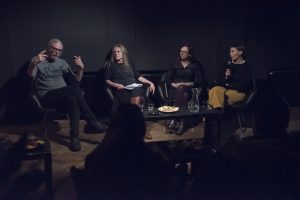Freaktion bar #12: ‘I will grow my burger’, Galerija Kapelica, Ljubljana, foto: Sebastijan Iskra
Freaktion bar #12: ‘I will grow my burger’, Galerija Kapelica, Ljubljana, foto: Sebastijan Iskra
Freaktion bar #12: ‘I will grow my burger’, Galerija Kapelica, Ljubljana, foto: Sebastijan Iskra
On the 17th of December 2019, Kapelica Gallery hosts a lecture by Theresa Schubert.
What if we produced the food that we eat from ourselves, i.e. from various cell cultures taken from our bodies, thus minimally burdening the environment in which we live?
The artist Theresa Schubert will discuss the ethical questions that emerge as a result of biotechnological food production and self-cannibalism, as she, with the help of experts and scientists, produces laboratory meat from her own muscle tissue in her art project. In the relaxed debate that will take place in the so-called scientific café, the artist will be joined by Stephen Minger, expert advisor in the field of regenerative cell technologies, and Ariana Barlič, the head of development in the partner company Educell, which deals with stem cells, and an expert co-worker in Theresa Schubert’s project.
The event was reflected in an article on Radio Študent 89,3 MHz 👇
The event shed light on the idea of auto-cannibalism, which could be called a radical idea of the future, where burgers could be made from their own cells in their home kitchen. Some people already resort to auto-cannibalism, such as nail-biting, skin, chewing hair and snot. Artist Theresa Schubert came up with the idea of growing a burger from her own muscle cells in the lab at the birth of her baby when the question of what to do with the placenta followed after giving birth. The placenta also says mother cake; some people ingest it after giving birth, what we call placentophagy. In some countries, however, homeopathic capsules can also be made from the placenta.
More and more companies want to present laboratory meat that is ethical, but we also need raw materials of animal origin to produce it. Cells, with the exception of cancers and some stem cells, do not multiply indefinitely, so we always need a new source that can only be obtained from new animals. Just as cows cannot be forced to give us more meat, we can only increase production by increasing the number of cattle in the stable. Thus, by growing meat in the laboratory, we do not get rid of the need to exploit cattle.
But why do we even eat burgers if we know we are hurting the planet? Cattle are too big an environmental pollutant, but meat from the lab is not the optimal solution, because for cells to make burgers, we still manipulate or need animals, and imitating meat or burgers from vegetable proteins is not really a burger for most people. Also, soy milk is not really milk, but a drink and peanut butter is not really butter, but a spread, and we could still list it.
Why don’t we just give up all the so-called risky foods and live off of tofu, fruits and vegetables? Of course, I’m exaggerating, but the question is in place. Remodelling a company to say no to a juicy burger seems like an extreme. Likewise, plant foods do not contain all the macronutrients and micronutrients needed by the human body. For each such deficiency, we know the nutritional supplements that are necessary in such cases. It is difficult to say how healthy or unhealthy a vegan or vegetarian diet is since there is not enough time to look at the massive effects that such a diet can have on the body or, consequently, on generations of people.
In fact, without nutritional supplements, vegetarians and vegans cannot compete with the health of omnivores. One hundred grams of beef contains on average about four times more protein than one hundred grams of tofu. So you would need to eat four hundred grams of tofu if you want to satisfy the amount of protein that comes with beef, and that grammar is unrealistic. Probably our stomach would blow up because of the bloating.
She also talked about genetically modified organisms and antibiotics in foods of animal origin. Criticizing these is pointless here since without them life and food production will not be possible in the future. The vast majority of genetically modified organisms and antibiotics are opposed by people with limited knowledge in the field. The fact is, however, that genetically modified organisms are a relief to us for the production and processing of food, and the use of antibiotics alone is not a problem if it takes into account withdrawal periods and other regulations. If we want a meat-free future, let’s not forget that soy and corn are some of the best.
—
Stephen Minger received his Ph.D. in Pathology (Neurosciences) and after worked in research of central nervous system gene therapy, neural transplantation and neural stem cell biology. Later he was appointed a Lecturer in Biomolecular Sciences at King’s College London. Minger’s research group has been at the forefront of human stem cell research. He was appointed Chief Scientist for Cellular Sciences, GE Healthcare Life Sciences, where he is still a part-time Senior Consultant.
Practical details



